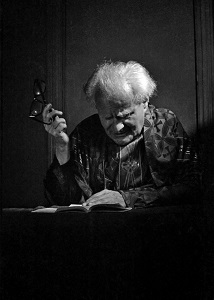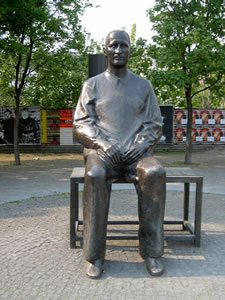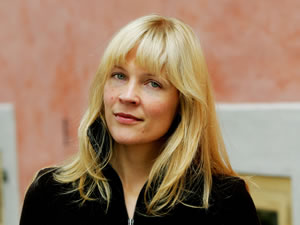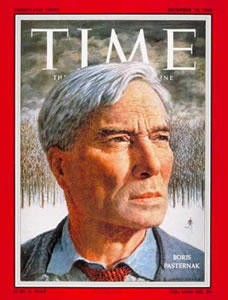De Noorse schrijver Johan Harstad werd geboren op 10 februari 1979 in Stavanger. Zie ook alle tags voor Johan Harstad op dit blog.
Uit: Ambulance (Vertaald door Deborah Dawkin en Erik Skuggevik)
“I’m lying on my back in the ambulance, firmly strapped to the stretcher and we’re driving very fast through town, somebody’s placed an oxygen mask over my mouth, and the man sitting next to me in a red and yellow jacket, who goes constantly from watching me to watching his bleeping instruments, asks me if I can hear him, but doesn’t wait for an answer, and he flicks various switches, attaches things to my body, to my chest, he yells out to the ambulance driver, “Faster, drive faster,” and then, “We’re losing him,” and I’m about to say I can hear him, but he turns his face away, he’s preparing an injection, I think, and I lie completely still, staring into the ceiling, we’re on the motorway, and each time we pass a streetlamp, a shaft of light flashes across the roof and vanishes to the left, and he asks if I can hear him, “Can you hear me,” he talks so loud, his voice almost cracks, “You must be used to this,” I think to myself, “surely, you must have seen worse than this,” and I try to grip hold of the stretcher on the turns, but there’s no sensation in my left arm, as if it’s not there, and my right arm feels weak, practically without strength, and again he asks if I can hear him, looks at me, straight at me, lifts my eyelids, points a flashlight into my pupils, and I want to shut my eyes because the light’s so bright, but he forces them wide open and I roll my eyes and he yells to the man at the wheel that he must drive faster, because I’m dying, and I consider how everything’s happened so fast, and then my focus slips, disappearing into the driver, who turns his head to see the patient lying firmly strapped at the back of the ambulance, and I think “He’s not going to pull through, I must drive faster, drive as hard as I can,” and I’ve switched my blue lights on, and at the back of the ambulance the man whose name I don’t remember is trying to establish contact with the patient, I call switchboard, state our position, tell them we’re on our way, request necessary equipment to be put on standby, we’re just ten minutes away.
I lie firmly strapped to the stretcher, everything’s bleeping all round, and the man in the red and yellow ambulance jacket sits next to me, swinging from side to side as the ambulance swerves through the streets, sirens blaring, and I stare at the roof, saying nothing, and he asks if I can hear him, my eyes meet his, I raise my head, very slowly, and nod, I can hear him, “Good,” he says, “we’re nearly there,” and I lay my head back on the pillow, it aches, I try to hold the stretcher tightly, but there’s no strength in my hands, I realize I’m pissing myself, it’s warm in my crotch and I lie completely still, there’s nothing I can do, I can’t stop it, I can only lie there feeling the urine seep through the my pants, down over my thighs, through my trousers and out onto the mattress, it’ll get cold, I’m so tired, it’ll have to stay there, and the man at my side takes my hand, even though I’ve pissed myself, and tells me I must keep looking at him, “Look at me,” he says, “just keep looking at me,” and I look at him.”

Johan Harstad (Stavanger, 10 februari 1979)
De Noorse schrijfster en journaliste Åsne Seierstad werd geboren in Oslo op 10 februari 1970. Zie ook alle tags voor Åsne Seierstad op dit blog.
Uit: A Hundred and One Days. A Baghdad Journal
“First comes the light. It filters through eyelids, caresses its way into sleep, and slips into dreams. Not the way it usually does, white and cool, but golden.
Half-open eyes peer towards a window framed by long lace curtains, two patterned chairs, a rickety table, a mirror and a chest of drawers. A gaudy sketch hangs on the wall: a bazaar where shadows of women in long, black shawls slide through dark alleyways.
I’m in Baghdad!
So this is what the morning light is like here. Furtive.
The next revelation awaits behind the wispy curtains: the Tigris.
It is as though I have been here before, the view jumps out from my childhood Bible. The meandering river, the rushes, the little palm-clad islands, the trees towering nobly above their reflection in the water.
From far below the cacophony of car horns reaches me, dull roars and sharp high-pitched squeals, a snailing chaos. The road follows the river bank.
I arrived under cover of darkness, a journey of twelve hours from the Jordanian to the Iraqi capital. Night fell long before we reached Baghdad. A few scattered street lights shone palely. Without our being aware of it we crossed the river.
Euphrates and Tigris – the starting point of everything. Even the Flood had its origins here: the land between the two rivers – Mesopotamia. The Tigris is a treacherous river. Under layers of mud, on the river plain, archaeologists have uncovered towns. The cataclysms led to the accounts of God’s judgement, the Flood that covered the whole world. The waters of the Tigris made the Hanging Gardens bloom. The Garden of Eden was somewhere near; the Tower of Babel within easy reach. From this country Abraham and Sarah were exiled.”

Åsne Seierstad (Oslo, 10 februari 1970)
Cover
De Nederlandse dichteres, schrijfster en theatermaakster Marjolijn (barones) van Heemstra werd geboren in Amsterdam op 10 februari 1981. Zie ook alle tags voor Marjolijn van Heemstra op dit blog.
Meer hoef dan voet
De hond verspert mij het pad, stokstijf, zijn tong
een roerloze vis tussen de tanden, zijn grom
een ondergronds geluid, als door lagen korst
gedempt
en ik denk aan de man die zei: We weten niet
waarheen de dieren zijn die zich traag, in duizend,
duizend jaren, onttrokken aan het zicht.
We weten niet over welke rand ze tuimelden,
welke zee het laatste exemplaar verzwolg.
Hij noemde de kieuwslak met vijf platte windingen,
de schrikvogel die liever liep dan vloog,
de majorcahaas, het reuzenhert,
niemand weet met zekerheid in welk bos,
welk veld het reuzenhert verdween.
De hond blaft naar mijn sporen,
in de verte zwaait een riem,een mens
die in mij een naaste herkent
maar ik weet wat de hond weet:
er zijn dieren verdwenen
en mijn afdruk is meer hoef
dan voet.
Aan een ruimtevaarder
(Voor André Kuipers)
Ik ben een cluster dode zonnen, hardgeworden overschot
vol weerstand, zelfs met maximale aanloop
kaatst de lucht mijn sprong nog voor kniehoogte terug
ik drijf alleen op water en zelfs dat maar tijdelijk
de ruimte tussen mijn gespreide armen
vangt geen wind.
Ik ga in zoogdiergang, van zand naar zand
kom niet boven het rumoer van vee
het geroezemoes van zee of ooghoogte
ik moet de satellieten maar geloven;
het kleurig stromend ozonvel
het fijne edelstenen ei.
Ik weet van vacuümgevaren
het netwerk van nevels en cellen
speldenknoppen poorten naar het licht
andersom heb ik de reis al vaak gemaakt
dit nietig sterrenstoffenlijf uitvergroot
tot lege zalen.
Maar jij hebt ontsnappingssnelheid
stapt straks met veren voeten de explosie in
telt jezelf tussen de sterren
zwemt in de afwezigheid van grond en getijden
ziet ons voor de vlekken die we zijn.
Als jij met niks dan lucht op je rug
in het schijnsel van het eerste moment —
wil je richting het duister draaien
en wil je zeggen dat ik er ben?

Marjolijn van Heemstra (Amsterdam, 10 februari 1981)
De Nederlandse dichter en schrijver Derek Otte werd geboren in Rotterdam op 10 februari 1988. Zie ook alle tags voor Derek Otte op dit blog.
Nou en of
een soort van onverschilligheid
wellicht nog wel ons grootste goed
omdat het hier uiteindelijk
vrijwel niemand iets kan schelen
of jij mijn of andere kijk
of ik op stand en jij de wijk
of jij nou u terwijl ik jij
één voor allen
allen voorbij
mede-, Neder-, anderlander
hier werkt wie er werken ken
wie d’r hier doorgaans weinig vrij
boeit het meestal toch vrij weinig
of jij zondag of toch vrijdag
of ik jou moet of jij mij mag
of jij nou wit terwijl ik zwart
soms hand in hand
vaak hart tot hart
al lijken we als dag op nacht
onze strijd gelijkenissen
het zou er hier toe kunnen doen
wat zou het uit moeten maken
of jij van dame of toch heer
of ik met minder jij met meer
of jij nou groots waar ik dan klein
vooruit komt voort
uit anders zijn
kaders tralies
hokjes fabels
ik heb jou als
jij dan mij hebt
geen goed of slecht
slechts nep of echt
hier zijn we wij
en zonder zij
een soort van onverschilligheid

Derek Otte (Rotterdam, 10 februari 1988)
De Nederlandse dichter en schrijver Jacob (Jac.) van Hattum werd geboren in Wommels op 10 februari 1900. Zie ook alle tags voor Jac. Van Hattum op dit blog.
De zwervende monnik
Zeg: God – en zie: op zijn gelaat
vertrekt zich slechts een enk’le spier,
maar ’t is, of een gemarteld dier
zijn felle klauwen naar U slaat.
Want onder dit grootmogend Woord
heeft men in ’t machtige convent
zijn ongebreideldheid gesmoord
en hem slechts boeten toegekend.
En die een zesde werelddeel
in kaart bracht en ook vinden zou,
was elke litanie te veel,
de pij het mind’re kleed der vrouw.
Hij wilde dolende alom
en niets, dan enkel zwervend zijn
en van convent en trotse dom
viel elke zuilengang te klein.
Vloekend het opgedrongen lot,
gelofte brekend’ en ontvlucht,
werd hem de groote naam van God
meer ontzagwekkend en geducht.
Zeg: God – en zie: op zijn gelaat
vertrekt zich slechts een enk’le spier,
maar ’t is, of een gemarteld dier
zijn felle klauwen naar U slaat.

Jac. van Hattum (10 februari 1900 – 19 augustus 1981)
Eind jaren 1960
De Duitse schrijfster Simone Trieder werd geboren op 10 februari 1959 in Quedlinburg. Zie ook alle tags voor Simone Trieder op dit blog.
Uit: Individuum
“An sonnigen Tagen steht er an einem Tischchen vor dem Kiosk und spielt mit seinen Kunden Schach. Zwischendurch versorgt er die Hungernden mit neuen Nachrichten aus der Königsebene. Schnell sind sie satt und nicken zufrieden in dem Bewusstsein, grad kein König zu sein, bei den Problemen. Und schon stellt sich der Hunger nach dem nächsten Blatt ein. Sie sehen nicht, dass der blondlockige Zeitungsverkäufer selbst ein König ist, der seinen Königs kollegen die Dame wegnehmen kann.
In seinem Kiosk zwischen Playboy und Geo, über Bild und unter Brigitte wippt an einer Wäscheleine, gehalten von nur einer Klammer, das ernste Porträt eines Literaten, dessen schmale Bändchen zu verkaufen er bereit ist.“
Grad gegenüber, genau am Eck ist der Zigarrenladen. Der Händler, dessen Frauen den Laden am Leben halten, ist nur zeitig, ganz zeitig anzutreffen, wenn er schon oder noch betrunken den frühen Zigarettenkäufern mit dem Wechselgeld den immer gleichen Kommentar zum wechselnden politischen Geschehen gibt: Es ist alles längst abgemacht und wir sind die Dummen. Kein Käufer widerspricht, denn er braucht seine Zigaretten. Vielleicht ist gar nicht der Chef, sondern nur eine Aushilfe, bis die Damen ihre Einkäufe erledigt haben. Oder die Post.
Wo die Schlangen der Enttäuschten nicht abreißen, der Versandfirma den Traumpullover zurück zu senden, weil er wider Erwarten kein Traum war. Zwischen die Enttäuschten mischen sich die Hoffnungsvollen mit roten Hektikflecken am Hals. Ihre Pakete und Briefumschläge enthalten Werbungen um Liebe, um einen Job, um Geld, die sie den blassen Damen hinter dem Schalter verschämt anvertrauen. Regungslos professionell stapeln die Hoffnung auf Enttäuschung bis unter die Decke. Nur ein Ticken in einem der Pakete kann sie irritieren. Sie schauen sich an, legen das Ohr an die einzelnen Pakete. Ein böser Blick streift die Kunden: Wir tun doch alles, was ihr von uns verlangt. Und ihr trachtet uns nach dem Leben. Dann klingelt ein Wecker. Da hat einer mit dem guten Gewissen, dass er das Postgeschäft erledigt hat, sich erschöpft niedergelegt und verpasst nun grad, woran ihn der Wecker erinnern sollte. An der Post vorbei geht eine Hausfrau und spricht in ihr Nokia-Handy: Du kannst die Kartoffeln jetzt aufsetzen.”

Simone Trieder (Quedlinburg, 10 februari 1959)
De Duitse dichter en schrijver Bertolt Brecht werd op 10 februari 1898 in de Zuid-Duitse stad Augsburg geboren. Zie ook alle tags voor Bertolt Brecht op dit blog.
Uit: Die heilige Johanna der Schlachthöfe
“DER FLEISCHKÖNIG PIERPONT MAULER BEKOMMT EINEN BRIEF VON SEINEN FREUNDEN IN NEW YORK.
Chicago, Schlachthöfe
MAULER liest einen Brief: „Wie wir deutlich merken, lieber Pierpont, ist der Fleischmarkt seit kurzer Zeit recht verstopft. Auch widerstehen die Zollmauern im Süden allen unseren Angriffen. Demnach scheint es geraten, die Hand vom Fleischhandel zu lassen, lieber Pierpont.“ Diesen Wink bekomme ich heute von meinen lieben Freunden aus New York. Hier kommt mein Kompagnon.
Er verbirgt den Brief.
CRIDLE: Warum so finster, lieber Pierpont?
MAULER: Erinnere, Cridle, dich, wie wir vor Tagen –
Wir gingen durch den Schlachthof, Abend war’s –
An unsrer neuen Packmaschine standen.
Erinnere, Cridle, dich an jenen Ochsen
Der blond und groß und stumpf zum Himmel blickend
Den Streich empfing: mir war’s, als gält er mir.
Ach, Cridle, ach, unser Geschäft ist blutig.
CRIDLE:Die alte Schwäche also, Pierpont?
Unglaublich fast, du, der Gigant der Packer
Des Schlachthofs König, vor dem Schlächter zittern
Zergehst in Schmerz um einen blonden Ochsen!
Verrat’s, ich bitt dich, niemand außer mir.
MAULER:O treuer Cridle!
Ich hätte nicht zum Schlachthof gehen sollen!
Seit ich in dies Geschäft hineinging, also sieben
Jahre, vermied ich’s, Cridle, ich vermag’s
Nicht länger: heute noch geb ich es auf, dies blutige Geschäft.
Nimm du’s, ich geb dir meinen Anteil billigst.
Dir gäb ich ihn am liebsten, denn wie du
Mit dem Geschäft verwachsen bist, ist’s keiner.
CRIDLE:Wie billig?
MAULER:Darüber kann’s bei alten Freunden
Wie du und mir kein langes Handeln geben.
Schreib zehn Millionen!”

Bertolt Brecht (10 februari 1898 – 14 augustus 1956)
De Russische dichter en schrijver Boris Leonidovich Pasternak werd geboren in Moskou op 10 februari 1890. Zie ook alle tags voor Boris Pasternak op dit blog.
Wind
I am no more but you live on,
And the wind, whining and complaining,
Is shaking house and forest, straining
Not single fir trees one by one
But the whole wood, all trees together,
With all the distance far and wide,
Like sail-less yachts in stormy weather
When moored within a bay they lie.
And this not out of wanton pride
Or fury bent on aimless wronging,
But to provide a lullaby
For you with words of grief and longing,
The Drowsy Garden
The drowsy garden scatters insects
Bronze as the ash from braziers blown.
Level with me and with my candle,
Hang flowering worlds, their leaves full-grown.
As into some unheard-of dogma
I move across into this night,
Where a worn poplar age has grizzled
Screens the moon’s strip of fallow light,
Where the pond lies, an open secret,
Where apple bloom is surf and sigh,
And where the garden, a lake dwelling,
Holds out in front of it the sky.
I Grew. Foul Weather, Dreams, Forebodings…
I grew. Foul weather, dreams, forebodings
Were bearing me – a Ganymede –
Away from earth; distress was growing
Like wings – to spread, to hold, to lead.
I grew. The veil of woven sunsets
At dusk would cling to me and swell.
With wine in glasses we would gather
To celebrate a sad farewell,
And yet the eagle’s clasp already
Refreshes forearms’ heated strain.
The days have gone, when, love, you floated
Above me, harbinger of pain.
Do we not share the sky, the flying?
Now, like a swan, his death-song done,
Rejoice! In triumph, with the eagle
Shoulder to shoulder, we are one.

Boris Pasternak (10 februari 1890 – 30 mei 1960)
De Surinaamse dichteres Carry-Ann Tjong-Ayong werd op 10 februari 1941 in Paramaribo, Suriname geboren Zie ook alle tags voor Carry-Ann Tjong-Ayong op dit blog.
Baanzand
verschroeide kindervoetjes
reppen zich door hete
kristallen korrels op weg naar
Bersaba
waar de
parakoranti kruimelig
lokken in de hutten
van pinabladeren
en droge stokken
in de middagkoelte
opgefrist door zuurwater
en pompelmoes
slepen zij
door de
nu weldadig
koele parels
hun weg terug
naar GeGe’s
rithmisch lonken
en de goudrode vonken
die de ijzeren draak
laat ontsnappen
als hij
zijn weg baant
onder de volle maan
in de oktobermaand
van
vakantiekindervreugd
baanzand
dat door
mijn vingers glijdt
als de sprookjes
die Ouma
mij toefluistert
met haar
warme stem
vol mystieke wonderen
van weleer

Carry-Ann Tjong-Ayong (Paramaribo, 10 februari 1941)
Hier tijdens een optreden samen met Patrick Karijowidjojo, 2008
Zie voor nog meer schrijvers van de 10e februari ook mijn vorige blog van vandaag.















